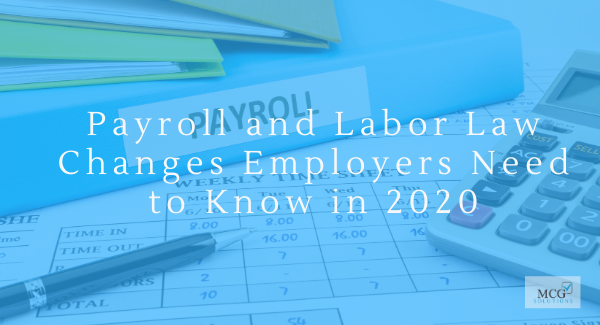January 1 is an important date, and not just because it’s a holiday. January 1 is often the date when new laws go into effect. Because payroll is a critical component of managing your business’ finances, we know how important it is to stay up to date on the latest local, state and federal labor laws.
How will 2020 laws impact your payroll and how you manage your business? Here’s what you need to know.
Overtime law changes for defining exempt employees
The Department of Labor (DOL) updated the minimum salary thresholds for exempt employees. Executive, administrative and professional employees are often considered “exempt” from minimum wage and overtime pay requirements. On January 1 the minimum salary threshold increased to $684 per week, up from $455 per week. Employers can still use nondiscretionary bonuses and incentive payments to satisfy at least 10 percent of the salary level.
The requirements are outlined under the Fair Labor and Standards Act (FLSA). The duties test for exempt employees remains the same.
Select state laws
In addition to the FLSA update, many states also have their own laws going into effect. Many of these laws are focused on improving work-life balance by offering better family leave terms. If you manage a business in one of these states, these are the updates you need to know:
- California: California is requiring companies to reclassify some independent contractors as employees and to offer them health benefits and paid time off. This is meant to protect gig economy workers, like those who drive for California-based companies Uber and Lyft. California is also enforcing stricter requirements for businesses to provide lactating mothers a private place to pump.
- Nevada: Now that recreational marijuana is legal in the state, Nevada will bar employers from refusing to hire candidates who test positive for marijuana in a drug test.
- New Jersey: Employers are no longer allowed to ask candidates about their salary history. This is to prevent eliminating candidates or making low salary offers based on previous pay.
- Oregon: Oregon is expanding a previous bill to require that all employers with six or more employees provide reasonable accommodations to pregnant workers unable to perform their regular duties.
- Washington: Eligible employees are now entitled to up to 18 weeks of paid family and medical leave per year. It is the fifth state to offer this much paid family leave, with more states following suit in the coming year.
Keep your business in compliance
Laws are a crucial factor impacting how you hire, manage and pay your employees. But you don’t need to wait for the government to enact new legislation to make changes to your policy. In the new year, consider reviewing your policies to see if your company can better support your employees. Take a look at your employee handbook to ensure you’re in legal compliance and that your policies support the work-life balance your employees deserve.
Any of these changes will impact your payroll and how you plan for paying your employees. Making these decisions can seem complicated, but it doesn’t have to be. A bookkeeper can help you keep payroll running smoothly. Contact the financial professionals at MCG Solutions to learn more.

